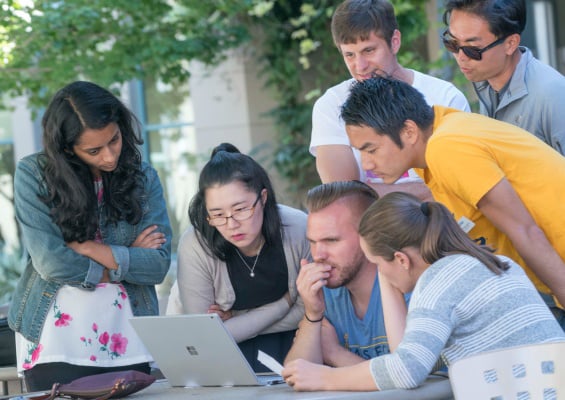Veronica Tang, MFE 21, has seen the future of finance—and she is following it.
Before entering the Berkeley Haas Master of Financial Engineering program, Veronica worked for five years as a trader on a systematic equity fund at BlackRock in Hong Kong and San Francisco. “As the trading sector was moving deeper into electronic execution, my job shifted more to looking at ways to reduce transaction costs and systematically implement future orders, deciding which algorithm to use,” she said. “This put me in close contact with teams that worked on longer-term and quant funds. Their work engaged my intellectual curiosity and showed me where I wanted my career to head.”
Today, Veronica is a principal at Blackstone, still in San Francisco, but now on the Blackstone Corporate Bond Strategies team. In her new role, she is among “the drivers” and she credits her studies with giving her the skills and insights needed for her new role.
Applying to the Berkeley Haas MFE program, was a “no-brainer” according to Veronica. She and her family were well-established in the Bay Area, meaning less disruption and an easy commute. A colleague at BlackRock who had completed the program also encouraged her. Veronica said she “knew that the school had excellent connections, not just in the finance industry but across many business sectors. That was valuable for recruitment purposes, and it meant that our professors were able to bring first-hand industry expertise into the classroom.”
For example, the first problem set assigned in her Fixed Income Markets (230I) class was to fit a curve to match Bloomberg’s results. “The professor warned us that this sounds easy, but no one in the previous cohort got the answer exactly right. What I learned in this class relates a lot to what I do now in managing corporate bonds, how we build the fundamental analytics. With equities, the information you need is given to you on a screen. For fixed income, you have to do the hard work to calculate things like spread duration. Simple things become complicated in fixed income.”
One of the biggest surprises for Veronica in her MFE studies was the professors’ insistence on teamwork in class assignments, from problem sets to projects. “I was expecting we would do our assignments on our own, sitting in front of our computers, coding and submitting our work individually. Instead, almost everything was done in teams,” she said. “This allowed each of us to bring our strengths to the project, and to get assistance from others to overcome our weaknesses. For example, I came to the program with strong industry knowledge in the equities trading area, but my math and coding skills were weaker,” she said.
“Each assignment was also an opportunity to improve our ability to manage team relationships. You came to understand different personalities and how to manage them for the best team performance,” she continued. “Teamwork is essential at Blackstone, so this was super-useful training.”
The teams of quants Veronica learned with at Berkeley Haas and works with at Blackstone are slowly beginning to look more like the real-world in the representation of women. While women are well-represented in the general finance field, they lag in the quant world, where women make up at best 20% of the workforce globally.
Veronica admits that she has had few women as role models or mentors in her career. She wants to change that. “The quant world is small, and your network helps you go far. To the extent that I can speak up for and support women, I am happy to do that,” Veronica said.
Having more women in programs like the Berkeley Haas MFE—the class of 2025 was one-third female—is a building block for the future. Veronica eagerly reviews the résumés of internship applicants from Berkeley Haas to evaluate “their technical skills and their past experience. The more diversity in skills and perspectives we can incorporate, the more well-rounded our teams will be,” she said. “Investments are a global business and having people experienced in the market signals from various countries and systems, the better off we are.”
As the mother of a 14-month-old son, Veronica is invested in the future of finance and financial literacy. She has reason for concern. Members of Gen Z (born from the mid-1990s to early 2000s) have the lowest financial literacy among living U.S. generations. And while 35 state mandate a financial literacy course as a high-school graduation requirement, teens still struggle with basic concepts. According to research by annuity.org, only 23% of teens report knowing how to create a budget, 32% don’t know the difference between a credit and debit card, and 41% don’t know what a 401(k) is.
“I want to make sure that my son understands finance. He may not share my passion for the subject, but you can only be in control of your life if you are in control of your finances. Skills such as knowing how to manage your debt and your credit, to save for education or for a big purchase, and certainly saving for retirement are essential, now and in the future,” she concluded.









